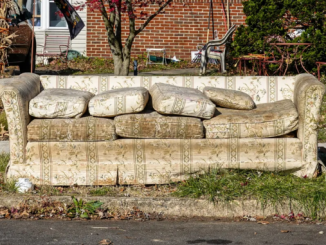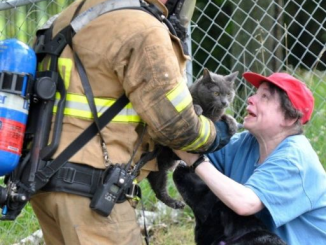
I didn’t think Dad would survive that first winter without her.
Grief made him unrecognizable. The man who once swore by fixing things—“If you can take it apart, you can put it back together”—let the house fall into a quiet kind of disrepair. The porch sagged. The garage door wheezed and stuck. And the dishwasher, once his prized weekend project, made a soft but persistent drip-drip-drip like it was crying with him.
I visited every Sunday, Mae in tow, hoping my daughter’s boundless energy might stir something in him. She was five, and to her, Pawpaw was a magical word. I didn’t have the heart to tell her that magic had packed up and left months ago.
That Saturday, the sky was smeared with low clouds, the kind that threatened rain but couldn’t be bothered to follow through. We’d brought over soup and fresh bread, the kind Mom used to make. I remember thinking, Maybe if he smells it… maybe if he closes his eyes…
But he didn’t.
He stirred the soup absentmindedly while Mae babbled about her new “fix-it kit,” which was basically a set of plastic tools she carried around in a glittery lunchbox. I let her roam, knowing she’d end up in the garage or by the old swing. Instead, she found the dishwasher.
It started with a thud.
I looked up from the couch, ready to call out to her when I heard another sound—metal on metal, followed by Dad’s voice, muffled and lower than I’d heard it in months.
Curious, I crept to the kitchen and peeked around the corner.
He was lying on his stomach, half-under the dishwasher, with Mae beside him, wielding a toy screwdriver like a pro. She had her serious face on, the one where her tongue poked out slightly in concentration. He wasn’t instructing her. He wasn’t correcting her. He was just… there. Watching. Breathing with her rhythm. Like she was leading him out of something.
Then she said it.
“Mommy says you’re the fixer. I wanna be one too.”
He didn’t speak for a long moment. I thought he might cry. But then he reached out, gently, placed his calloused hand on her tiny back, and said, “You already are.”
That moment cracked something open in him. And in me.
The next weekend, Dad cleaned out the garage. The weekend after that, he fixed the porch steps—squeak and all. He even found Mae a real mini toolbox at a flea market and told her, very seriously, that every fixer needed good tools and better questions.
Mae became his apprentice. They tackled a new project every week—drawers, doors, a ceiling fan that hadn’t worked in six years. I watched them from the doorway, wondering if this was what healing looked like. Not a sudden light, but a slow turning toward it.
Then, something strange happened.
One afternoon, I came by to pick up Mae and found the garage empty. The door was open, but the tools were untouched. I went inside and called out, and that’s when I heard laughter—two voices, soft and familiar, coming from the backyard.
Dad and Mae were seated at the base of the old maple tree. In front of them was a wooden box. Not just any box—the box. The one that used to hold Mom’s recipe cards and notes, the one he hadn’t touched since she died. It had been tucked away on the top shelf of their closet.
I froze.
He was showing her the contents like it was a treasure chest. Her hands fluttered over folded paper, yellowing photos, a sewing thimble, a cracked brooch.
“She used to write notes to herself,” he was saying, smiling. “Little reminders. About life, I guess. Or me. Or you.”
Mae was mesmerized. So was I.
He paused, then held up a small, square piece of paper. I recognized Mom’s looping cursive even from a distance. His eyes scanned the note. Then he read it aloud:
“Fix what you can. Love what you can’t. And never stop learning the difference.”
Mae blinked. “What’s that mean?”
He looked up, straight at me.
“It means your mommy got her stubbornness from someone.”
And that’s when I realized this was bigger than grief. Bigger than fixing things. Dad was building again—just in a different way.
The story might’ve ended there. A neat bow. But life doesn’t do bows.
A few months later, I got a call from Dad.
“Hey,” he said, “I need a favor. Think Mae could come with me next Saturday?”
“Where?”
He hesitated. “A house I know. The kitchen sink leaks. The man’s too proud to ask for help. But I figure if she shows up with her pink toolbelt…”
It hit me then: He wasn’t just healing. He was paying it forward.
They made it a ritual—Fix-It Saturdays. Sometimes it was a neighbor. Sometimes an old friend. Sometimes just an elderly woman who needed someone to unstick a stubborn drawer and stay for tea.
People started leaving notes in his mailbox. Word got around about “the grandpa and the little girl with tools.” Mae started collecting stickers for every fix. I started collecting memories of the two of them, framed in quiet laughter and warm light.
But the real twist came last fall.
Mae’s school had a “What I Want To Be” day. The usual suspects: astronauts, firefighters, doctors. Then Mae stood up, toolkit in hand, and said proudly, “I want to be a fixer. Like my Pawpaw.”
The room went still.
She looked around, searching, then added, “But not just stuff. People too. ‘Cause sometimes people are the things that need fixing most.”
And I swear—I saw the teacher wipe away a tear.
I walked her home that day, hand in hand, feeling like something had clicked into place. Like maybe grief doesn’t end, but it softens when shared. When used. When transformed.
Dad’s dishwasher still leaks a little. He says it’s “character.” Mae says it’s a mystery. They lie under it together once in a while, pretending to solve the world’s problems with a socket wrench and a snack break.
And sometimes I think—maybe they do.
Because fixing isn’t always about the thing. Sometimes, it’s about who you become while trying. Sometimes, it’s about who crawls under the mess with you and reminds you you’re still needed.
So here’s to the fixers. The quiet builders. The jelly-handed apprentices who shine a light in places we thought would stay dark.
If this story touched you, share it. You never know who might need a reminder:
You already are.






Leave a Reply